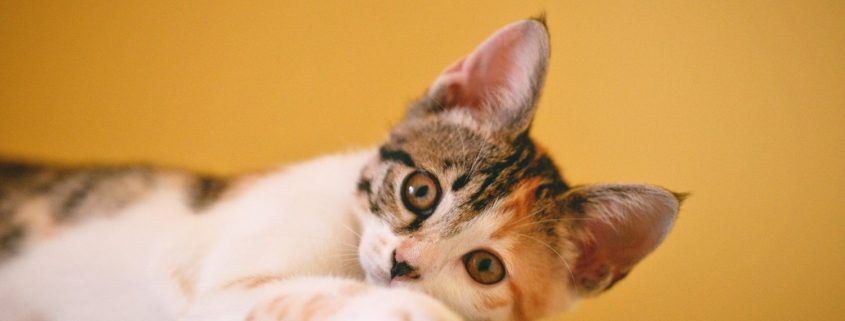Ask Crystal: New Cat Won’t Use Litter Box
Welcome to “Ask Crystal,” where you can ask your pet behavior questions! You can submit your question for Crystal at the bottom of the page!
Dear Crystal,
My new cat keeps having accidents outside of her litter box. I am not sure what is going on with her. Can you help?
Sincerely,
Frustrated Feline Mom
Dear Frustrated,
 Congratulations on adopting your new kitty! As most people know, cats in general are fastidious creatures so soiling outside of the box can be quite unexpected for most pet owners. It is believed that up to 10% of cats will develop some type of litter box issue during their lifetime. The reasons for this behavior are quite varied and can range from an unclean litter box to health problems. Let’s explore the variety of reasons this behavior can develop and how we can try to narrow down the cause and hopefully eliminate the behavior.
Congratulations on adopting your new kitty! As most people know, cats in general are fastidious creatures so soiling outside of the box can be quite unexpected for most pet owners. It is believed that up to 10% of cats will develop some type of litter box issue during their lifetime. The reasons for this behavior are quite varied and can range from an unclean litter box to health problems. Let’s explore the variety of reasons this behavior can develop and how we can try to narrow down the cause and hopefully eliminate the behavior.
Inappropriate elimination can be a manifestation of stress. If your new cat is having accidents, one possible cause is the stress of moving in with you has her feeling a bit out of whack. To cut down on stress, try to keep her daily routine as predictable as possible. I recommend keeping new cats isolated to one room for a period of time which could be anywhere from two weeks to a couple months. This will give her a quiet, calm and safe environment to get settled in. If you have a dog, make sure that your dog is not able to chase her. You may need to close blinds if there is a neighborhood cat wandering outside the window.
Cats can also develop a new substrate preference so they may start to decide your carpet is their preferred substance if you allow the behavior to go on for too long. In order to prevent her from eliminating in the undesirable spots, try to make them as unappealing as possible. You can use tin foil, double sided tape or motion activated lighting to discourage her from undesirable locations. Use an enzymatic cleaner to clean up any urine or feces accidents so they will be less likely to return to that spot.
It is also possible that your cat prefers a different litter type or a different type of box. Most cat owners know how particular kitties can be. A majority of kitties prefer unscented clumping litter over other types. It makes sense because our cat’s ancestors used sand and soft soil. They also don’t like to step on wet litter which clay will become once used. They also seem to prefer large litter boxes without liners or lids and a shallow amount of 1-2 inches of litter. Be sure to keep the litter clean by scooping it daily. If you have a declawed kitty with litter box issues, try a very fine clumping litter which will be more comfortable on their delicate paws.
Location, location, location is important in litter box positioning as well as in real estate. Most cats prefer a quiet location so don’t put their box in the middle of a busy area of the house. Cats can form a negative association with their litter box if they are scared or startled whilst using the facilities. They also like to be able to see who is coming and to have multiple escape routes if they do get spooked. Make sure their food and water are not near the litter box. Most cats don’t want food near their litter. If you have multiple cats, the issue may be discomfort with the other kitty. Be sure to offer multiple boxes in multiple areas in case the issue is avoidance of the other cat. The rule of thumb is one more litter box than cats in the house.
If after trying these methods you don’t find a solution, you may want to make an appointment with your veterinarian. There are a variety of medical problems that can cause litter box issues. Urinary tract infections, bladder stones and feline interstitial cystisis can all create litter box issues because of painful elimination. This painful elimination can cause a negative association with the box.
 To retrain your cat to have a new association with the litter box, there are some methods we can try. You may try your box in a new location with a new type of litter. You can experiment with the type of box. Some people use large, low sided plastic totes as litter boxes. Many cats respond really well to automatic cleaning litter boxes which will help if the issue is with the box cleanliness. Playing with toys in the area leading up to the new litter box area may help them develop a more positive association with the box. There is also a brand of cat litter with cat attractant in it that has many cats start using the box again.
To retrain your cat to have a new association with the litter box, there are some methods we can try. You may try your box in a new location with a new type of litter. You can experiment with the type of box. Some people use large, low sided plastic totes as litter boxes. Many cats respond really well to automatic cleaning litter boxes which will help if the issue is with the box cleanliness. Playing with toys in the area leading up to the new litter box area may help them develop a more positive association with the box. There is also a brand of cat litter with cat attractant in it that has many cats start using the box again.
Good luck and I hope you find a solution that works for you and your new kitty.
Until next time,
Crystal







